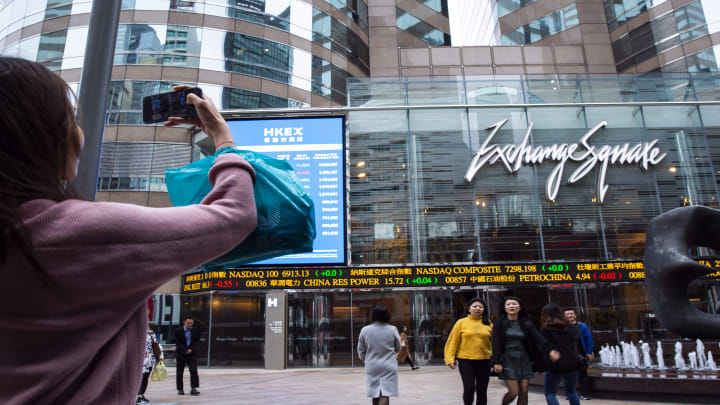Asia Pacific markets rebounded Thursday after U.S. President Donald Trump’s comments on the Iran conflict eased investor worries about further escalation of geopolitical risks in the Middle East.
The Nikkei 225 in Japan gained 2.31% to 23,739.87, erasing its losses from the previous session. The Topix index added 1.63% to 1,729.05.
In South Korea, the Kospi was up 1.63% to 2,186.45, while Hong Kong’s Hang Seng index rose 1.35% in afternoon trade. Australia’s ASX 200 rose 0.83% to 6,874.20, with the heavily weighted financials subindex gaining 0.5%.
Chinese mainland markets also traded higher: The Shanghai composite added 0.91% to 3,094.88, the Shenzhen composite was up 1.75% to 1,800.63 and the Shenzhen component gained 1.79% to 10,898.17.
“As sentiment improves, market participants unwound safe-haven bets with broad relief sell-off in the bond universe,” Huani Zhu, an economist at Mizuho Bank, wrote in a morning note. “Whilst both the US and Iran had their ‘proportionate retaliation’ for now, we believe that it is in neither side’s interest to escalate further.”
U.S.-Iran tensions ease
Stocks sold off in Asia on Wednesday after Iran launched more than a dozen ballistic missiles against military bases housing American troops in Iraq. The strike followed the U.S. killing of Iran’s top general, Qasem Soleimani, last Thursday in Baghdad. Iran had promised retaliation after the attack.
Trump then said Iran appeared to be “standing down” but added the U.S. will “immediately impose additional punishing economic sanctions on the Iranian regime.”
His remarks appeared to put investors at ease as U.S. stocks rose overnight.
“The main driver was President Trump’s delayed response to the missile strike yesterday, suggestive that he was taking a more cautious approach (than) his usual demeanour and prior tweets suggested,” Tapas Strickland, director of economics and markets at the National Australia Bank, wrote in a morning note.
“Markets have now largely unwound the risk-off moves that have occurred since Friday,” Strickland added.
Still, following Iran’s attack, a report on Wednesday said two rockets fell inside the Green Zone in the Iraqi capital — it is the section in Baghdad that contains the U.S. Embassy, other embassies of Western nations and foreign businesses, according to Reuters. There were no casualties, Iraq’s military said in a statement.
The Nikkei 225 in Japan gained 2.31% to 23,739.87, erasing its losses from the previous session. The Topix index added 1.63% to 1,729.05.
In South Korea, the Kospi was up 1.63% to 2,186.45, while Hong Kong’s Hang Seng index rose 1.35% in afternoon trade. Australia’s ASX 200 rose 0.83% to 6,874.20, with the heavily weighted financials subindex gaining 0.5%.
Chinese mainland markets also traded higher: The Shanghai composite added 0.91% to 3,094.88, the Shenz
“As sentiment improves, market participants unwound safe-haven bets with broad relief sell-off in the bond universe,” Huani Zhu, an economist at Mizuho Bank, wrote in a morning note. “Whilst both the US and Iran had their ‘proportionate retaliation’ for now, we believe that it is in neither side’s interest to escalate further.”
U.S.-Iran tensions ease
Stocks sold off in Asia on Wednesday after Iran launched more than a dozen ballistic missiles against military bases housing American troops in Iraq. The strike followed the U.S. killing of Iran’s top general, Qasem Soleimani, last Thursday in Baghdad. Iran had promised retaliation after the attack.
Trump then said Iran appeared to be “standing down” but added the U.S. will “immediately impose additional punishing economic sanctions on the Iranian regime.”
His remarks appeared to put investors at ease as U.S. stocks rose overnight.
“The main driver was President Trump’s delayed response to the missile strike yesterday, suggestive that he was taking a more cautious approach (than) his usual demeanour and prior tweets suggested,” Tapas Strickland, director of economics and markets at the National Australia Bank, wrote in a morning note.
“Markets have now largely unwound the risk-off moves that have occurred since Friday,” Strickland added.
Still, following Iran’s attack, a report on Wednesday said two rockets fell inside the Green Zone in the Iraqi capital — it is the section in Baghdad that contains the U.S. Embassy, other embassies of Western nations and foreign businesses, according to Reuters. There were no casualties, Iraq’s military said in a statement.
